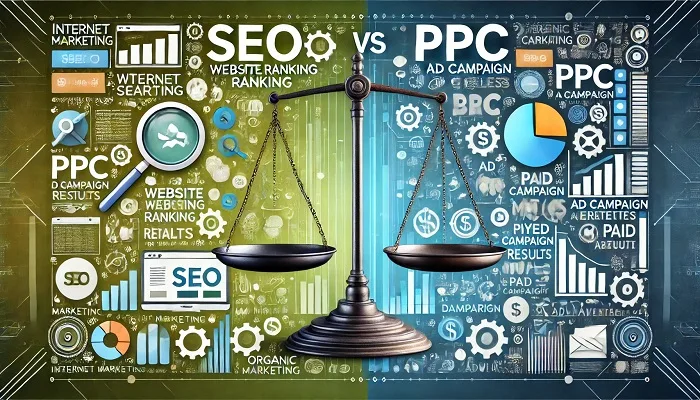
SEO vs. PPC: Which Internet Marketing Strategy is Right for You?
In the evolving world of digital marketing, businesses are often faced with a critical decision: whether to invest in Search Engine Optimization (SEO) or Pay-Per-Click (PPC) advertising. Both strategies have their unique advantages and can significantly impact your online visibility and business growth. In this article, we will compare SEO and PPC, examining their benefits, drawbacks, and the best scenarios for their use, to help you decide which internet marketing strategy is right for you.
Understanding SEO
SEO involves optimizing your website to rank higher in organic search results on search engines like Google. This strategy focuses on improving various aspects of your site, including content quality, keyword usage, site speed, mobile-friendliness, and acquiring backlinks. SEO is a long-term strategy that requires continuous effort but can lead to sustainable traffic growth.
The primary benefits of SEO include increased organic traffic, improved credibility and trust, and cost-effectiveness in the long run. However, SEO also comes with challenges such as the time required to see results and the constant need for updates and adaptations to changing search engine algorithms.
Benefits of SEO
- Cost-Effective: SEO primarily involves upfront time and effort rather than ongoing costs.
- Long-Term Results: Once established, high-ranking pages can continue to attract traffic without additional costs.
- Enhanced Credibility: Users often trust organic search results more than paid advertisements.
Drawbacks of SEO
- Slow Results: It can take months to see significant improvements in rankings and traffic.
- Algorithm Changes: SEO strategies must adapt to frequent updates in search engine algorithms.
- Requires Expertise: Effective SEO requires a deep understanding of search engine behavior and user intent.
Understanding PPC
PPC advertising involves paying for ad placements on search engines or other platforms. Advertisers bid on keywords, and their ads appear when users search for those terms. You pay each time a user clicks on your ad. PPC can deliver immediate results, making it an attractive option for businesses looking to generate quick traffic and sales.
The primary benefits of PPC include immediate visibility, precise targeting, and measurable results. However, PPC also has its drawbacks, such as the costs associated with maintaining campaigns and the potential for high competition driving up prices.
Benefits of PPC
- Immediate Results: Ads can start driving traffic as soon as campaigns are launched.
- Targeted Advertising: PPC allows for precise targeting based on demographics, location, and user behavior.
- Measurable ROI: PPC platforms provide detailed analytics to measure the performance of campaigns.
Drawbacks of PPC
- Cost: PPC can become expensive, especially for highly competitive keywords.
- Short-Term Impact: Traffic stops when you stop paying for ads.
- Requires Ongoing Investment: Continuous funding is necessary to maintain traffic levels.
When to Use SEO
SEO is ideal for businesses looking to build a strong online presence over time. If you have a limited budget but are willing to invest time and resources into creating high-quality content and improving your website, SEO is a suitable strategy. It’s particularly beneficial for industries where consumers rely heavily on organic search to find products or services.
SEO is also advantageous for establishing authority and trust. By consistently providing valuable content and earning backlinks from reputable sites, you can position your business as an industry leader.

When to Use PPC
PPC is best for businesses that need quick visibility and immediate results. If you’re launching a new product, running a limited-time promotion, or seeking to quickly drive traffic to a landing page, PPC is an effective strategy. It’s also useful for targeting specific demographics or geographic areas, making it a versatile tool for various marketing goals.
Moreover, PPC can complement your SEO efforts by providing immediate traffic while your SEO strategy takes time to develop. This dual approach ensures you have a steady flow of visitors from both paid and organic sources.
Combining SEO and PPC
For many businesses, a hybrid approach that leverages both SEO and PPC can yield the best results. By combining the long-term benefits of SEO with the immediate impact of PPC, you can create a comprehensive digital marketing strategy that maximizes your online visibility and ROI.
For instance, you can use PPC to target high-converting keywords and drive traffic to specific landing pages, while using SEO to builda strong foundation and attract organic traffic over time. This approach ensures a balanced and effective marketing strategy that adapts to different needs and goals.
Choosing between SEO and PPC depends on your business goals, budget, and timeline. SEO offers sustainable growth and increased credibility, making it ideal for long-term strategies. On the other hand, PPC provides immediate results and precise targeting, perfect for short-term campaigns and quick traffic boosts.
Ultimately, the best approach may involve a combination of both strategies, leveraging the strengths of each to create a robust and adaptable internet marketing plan. By understanding the unique advantages and limitations of SEO and PPC, you can make informed decisions that drive your business forward in the digital landscape.
